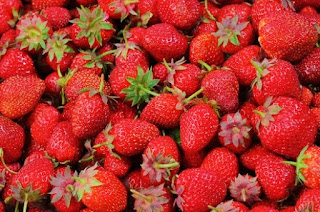Healthy
eating habit is not as difficult as many people think. The essential part of
how to develop a healthy eating habit is by consuming organic foods (Foods processed
with fewer artificial methods, materials and conditions, such as chemical
ripening, food irradiation, and genetically modified ingredients). Today, I
am going to share some tips on how to build a healthy diet.
Eating a
Variety of Foods
Eating
many combinations of food makes it easier to get a balanced diet. Not all foods
have the amount of nutrients needed for your food to be balanced, so when you consume
or choose from a wide variety of foods you're more likely to get all the
essential nutrients you need every day.
Keep an Eye on Portions
A
portion can be thought of as the amount or size of food you choose to eat at a
particular eating occasion. It could be breakfast, dinner, snacks and all but
when it comes to higher-calorie foods; this is where portion control is needed.
Health professionals say in recent
years, portion sizes have become "supersized" – double or triple
times bigger than they used to be. And because we automatically seem to want to
fill our plates with food, a bigger plate also leads us to eat more.
Go for
Variety
When
next you go to the grocery store, ensure that you take you time to check all
those fruits and vegetables. See their different colours? That's essential because
the compounds that give fruits and vegetables their colour also contain
beneficial antioxidants that may have health benefits. So if you eat fruits and
vegetables with variety of colours, you will sure get lots of different antioxidants.
Same
goes with whole grains. Instead of eating just wheat all day, try out
other grains. Oats are high in fibre that specifically lowers cholesterol,
and quinoa is higher in protein than wheat.
Enjoy More
Fish and Nuts
Nuts,
fatty fish, avocados and vegetable oils supply healthy unsaturated fats. Recent
research has it that nuts, vegetable oils, fatty fish supply healthy
unsaturated fats. These foods are high in calories but don’t promote weight
gain because they are satisfying. As far as your meat and protein sources, be
sure to add in some fresh fish that's high in omega-3 fatty acids and
experiment with plant-based protein sources, such as legumes, nuts and seeds
that are also high in fibre and other nutrients.
Cut Down on
Animal Fat
Saturated
fats, especially from red meat and processed meat, boost LDL (“bad”)
cholesterol. To limit your intake, choose lean meats, skinless poultry and non-fat
or low-fat dairy products. It’s also a good idea to replace saturated fats with
“good” fats, found in nuts, fish and vegetable oils, not with refined
carbohydrates such as white bread and snack foods.
Cutting Back
On the Sodium, Upping the Potassium
Salt is made up of two
substances, sodium and chlorine, and it's the sodium that can affect your blood
pressure. This is because the sodium you eat affects how much water your
kidneys extract from your blood.
The
more sodium you have in your blood, the less water your kidneys will extract.
As a result, your blood volume increases and because your circulation is
essentially a closed system of tubes then up goes your blood pressure.
Potassium
can actually help to control blood pressure so it's a great substitute for
sodium. Low-sodium salt brands often contain relatively high levels of
potassium. So these are good options if you still want to use salt. Great
natural sources of potassium include: bananas, oranges, tomatoes, apricots and
currants
Watch Your
Calcium and Vitamin D
The
bones contain lots of calcium. Calcium and Vitamin D are very crucial and vital
for bone health. Get calcium from low-fat dairy products and fortified foods
such as some orange juices and soy drinks. Calcium is the nutrient that helps us
build new bones, so if you want to have healthy bones, you need enough calcium.
However, Vitamin D is equally needed because the body requires that to properly
absorb the calcium. If there is no enough vitamin D, most of the calcium you
have taking in won’t be put into use. As you watch your bone health, it is
important to keep an eye on how much calcium and vitamin D you are getting.










0 comments:
Post a Comment